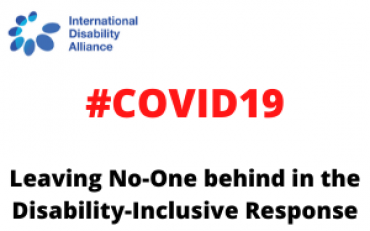This is one story as part of the Voices of People with Disabilities during COVID19 Outbreak series
The International Disability Alliance interviewed two women with psychosocial disabilities from the United States to document their experiences during the pandemic. Names have been changed to protect the individuals mentioned in the story.
Emma is a 35 year old woman with psychosocial disability living in Wyoming, in the mountain region of the Western United States. Emma experiences lots of barriers and ignorance because people can’t find her disability at first sight. “When you look at me, it doesn’t look like I have a disability and I seem to be invisible”, she says.
The COVID-19 pandemic was confirmed to have reached the U.S. state of Wyoming in March 2020. On April 13, Wyoming became the last state in the U.S. to report its first death from COVID-19. On April 14, Wyoming reported its 2nd COVID-19 related death. As of May 14, Wyoming was the state with the fewest number of deaths from COVID-19.
Emma experiences post-traumatic stress disorder and social anxiety which means that seeing her psychologist is vital for her mental wellbeing. “I don’t receive any support except speaking to my psychologist via telehealth and this is not helpful”, she says.
A similar experience is shared by Jennifer, a 44 year old woman with a psychosocial disability living in California. She hasn’t received any doctor visits nor therapy since COVID-19 and this has had a negative impact in her mental health. Religion is important in her life: “I'm not able to attend religious services so instead we call into zoom meetings.”, she says. She is spending more time with her family, which she appreciates but this can sometimes increase her levels of stress. One of the challenges she faces is having to wear a mask in public, as it makes her feel more anxious and uncomfortable.
Emma has had an infection unrelated to COVID-19 for the past weeks which hasn’t been properly treated due to the outbreak. She says that hospitals and doctors have focused entirely on COVID-19 patients and any other medical assistance is almost inexistent. “They said they could only provide antibiotics for my infection after I was tested for COVID-19. Until then, they said I should go back home and wait. I could have died”, she says. The results came back negative and she is now on her fifth round of antibiotics, which she says aren’t effective. “I’m still sick. The hospital won’t call me back because they think my health issue not urgent, and they are too busy with COVID-19. I’m scared of dying, I should be in a hospital right now”, she says.
Emma explains that having an invisible disability makes it very difficult to make others understand what her situation is like. She sometimes has trouble explaining herself and is often discriminated against for her disability. “When I try to explain myself, they often just want to refer me to psychiatry”, she says. She believes there is a general lack of understanding and awareness regarding psychosocial disabilities in her area.
“I need to find another doctor as I can’t go to the hospital closest to my home because they wouldn’t admit me and keep sending me back home. Despite symptoms and signs (fever for a month), they expect me to wait for COVID-19 to end and pray I live long enough”, she says. Emma says that having a car would make a difference for her as she could drive to another state and get the medical attention she needs. She did have money saved up to buy it but has had to spend it during COVID-19.
In addition, Emma has two children, one of whom has a psychosocial disability and his needs are not being met due to confinement. She has to take care of him and support him with his school work. “I need my time and space and I’m not having that. I’m not a school teacher and have all these extra jobs that are very overwhelming”, she says. Home schooling is not adapted to her son’s needs and there is no official school plans. “The education he was getting before COVID-19 wasn’t good and now it has been made worse, he is completely ignored. We look like we don’t have a disability and we fall through the cracks”, she says. Emma’s son is struggling with having to stay at home and not being able to socialize. “He needs social interaction, he feels like walls start closing in and he is trapped. He could have a breakdown every second and we would need to go to the hospital, what would happen then?”, she wonders.
Both Jane and Emma have been financially struggling since the outset of the pandemic. Emma is an artist and due to COVID-19, she has lost her job. She is not receiving a disability allowance, nor any unemployment benefits. She relies on her son’s disability allowance and on food banks to feed her family. “We have been forgotten, left behind and that makes us feel very lonely”, she says.
Jane has not been included in any social protection program designed to support persons with disabilities. “Why has Social Security has decided to issue everyone their stimulus checks and those on disability are getting theirs last ?”, she wonders.

